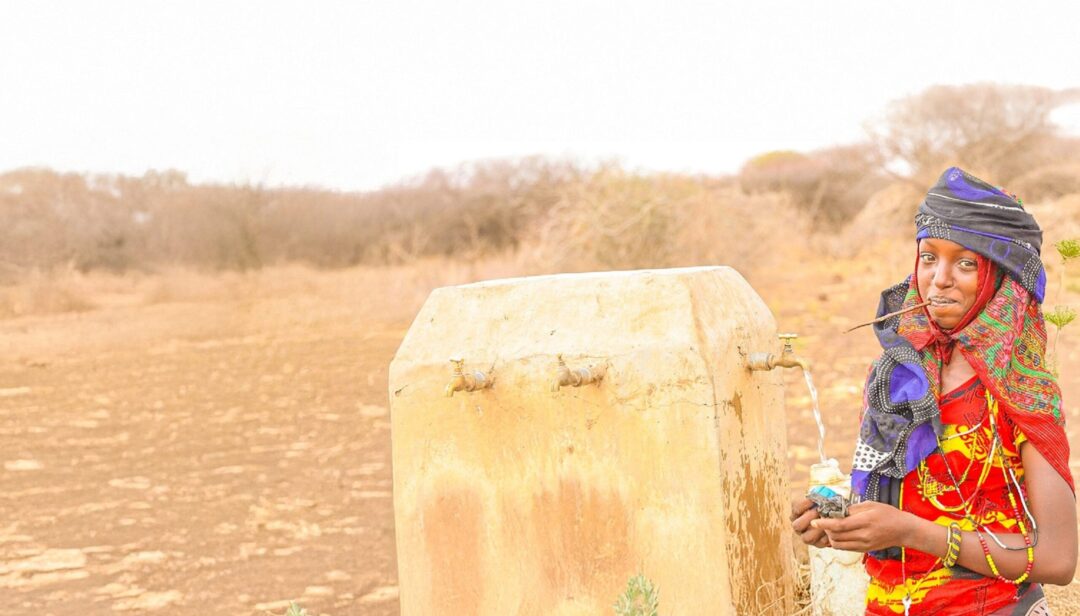 Stories
Stories
May 13, 2025 • 3 min read
In the Borena Zone of the Dilo District of Ethiopia, water scarcity shapes the lives of pastoral communities. For Adi Haro, the lack of clean water made tending to the family flock an ever-constant struggle. With the arrival of GOAL’s support, the community has been able to harness solar power their water pumps, bringing reliable access to clean water and transforming the lives of shepherds like Adi.
Pastoral Life in the Borena Zone
For years, the pastoralist community in Dilo struggled against the harsh, unforgiving climate and severe water scarcity of the region. During the dry season, families had no choice but to walk for hours in search of clean water. Adi Haro, a 9-year-old shepherd from the Dilo District in Borena Zone, has spent her childhood caring for her family’s goat flock. Growing up as the eldest child in a pastoralist family, she shoulders the responsibility of tending to the family’s livestock. This responsibility demands a great deal of Adi, as she spends her afternoons watching over the goats beneath the shade of acacia trees. Adi takes pride in her role, knowing that this helps her family secure a livelihood and allows her younger siblings the opportunity to attend school. However, life as a pastoralist in the Borena Zone is far from easy. Adi, like many other providers in the community, would trek for up to 20 kilometres, a three-hour journey, to fetch water for their family and livestock. This grueling routine was a daily reality for many, consuming time, energy, and resources, and shaping daily life in the Borena Zone.
“We are pastoralists, so our lives revolve around finding water and grass for our livestock and families. This means we are constantly moving, and at least one family member must always travel with the animals,” explains Haru Wako, Adi’s father.

A Temporary Solution
In an effort to ease the community’s struggles, aid organisations stepped in, digging a deep well and installing a generator to pump water. At first, hope surged through Dilo, clean water was finally within reach. But the relief was short-lived. The generator, though powerful, came with a hidden cost. Fuel was expensive, draining 5,000 ETB (€34.30) every day or two—an amount the community simply could not afford. And even if they managed to gather the money, getting the fuel was another ordeal. It had to be transported over 150 kilometres by motorbike, and even then, the generator often failed to start, leaving the community in despair.
Harnessing Solar Power for Sustainable Change
In late 2024, GOAL, with generous funding from the Ethiopian Humanitarian Fund (EHF), launched an anticipatory project in Borena Zone to address Dilo’s water crisis. Recognising the limitations of the existing system, GOAL introduced solar technology to replace the unreliable fuel-powered generator. By harnessing the sun’s limitless energy, the new solar-powered system provided a steady and sustainable water supply, eliminating costly fuel expenses and maintenance challenges. This innovative solution transformed the community’s access to water, bringing a new lease of life to the community.
“The solar energy system has resolved our community’s multiple social and economic challenges. Now, we have access to clean water powered by renewable energy. Women no longer need to spend hours searching for water, which will profoundly impact health, education, and overall quality of life,” said Gudana Kambere, an official from the district water and energy office.
A Future of Prosperity
With the restoration of the water scheme using solar technology, Adi and her community no longer face the daily struggle of fetching water from distant sources. Families and their livestock now have reliable access to clean water within their village, bringing stability and hope for a brighter future.
“Water was our biggest challenge. Our burden has been lifted now that we have it in our village. We no longer have to travel long distances for it, and this means a more stable life. It also creates better conditions for sending all our children to school,” shared Adi’s father.
Today, Adi’s goats drink from the clean water source near their home, and her community is thriving. Introducing solar-powered water systems has alleviated immediate hardships and paved the way for long-term development, ensuring that children like Adi and her siblings can dream of a brighter future.
